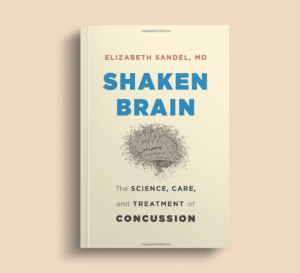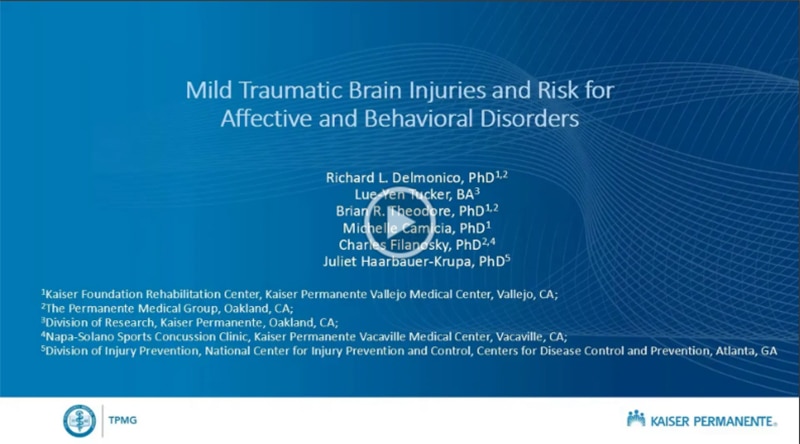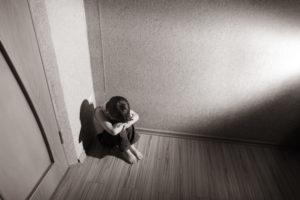Is There a Connection Between Mild TBI and Mental Health Disorders in Adults and Children?

The Latest Concussion Research from Kaiser Permanente
Researchers at Kaiser Permanente have published two major population studies on mild TBI (mTBI) and mental health disorders in the last several years.
In the first study, published in the journal PM&R in 2021, Richard Delmonico and colleagues found that mTBI was associated with a significantly increased risk of having subsequent affective disorders for both adults and children, most prominent during the first 12 months after injury.
Concussion Increases Risk for Affective Disorder, Especially for 10 to 13 Years Olds
In the most recent study, focused on children and adolescents and published in the journal Pediatrics in 2024, Delmonico and colleagues found that risks for affective disorders were significantly higher across the first 3 years post-injury for children and adolescents with a history of mTBI. The age group with the highest risk for post-injury affective and behavioral disorders was 10- to 13-year-olds.
This post includes a PowerPoint presentation and a Q and A with the researchers who emphasize the importance of regular interval screening for affective and behavioral disorders in children and adolescents who sustain a mild TBI for years after the injury.
Q and A with Authors Richard Delmonico and Brian Theodore
About Their Study on Mild Traumatic Brain Injury (mTBI) and Mental Health Disorders in Children
[Delmonico RL, Tucker L-Y, Theodore BR, et al. Mild Traumatic Brain Injuries and Risk for Affective and Behavioral Disorders. Pediatrics. 2024;153(2):e2023062340.]
In a previous study of mTBI, we found that mTBI was associated with a significantly increased risk of having subsequent affective disorders. These disorders were most prominent during the first 12 months (23% following mTBI and 14% in the control group).
[Delmonico RL, Theodore BR, Sandel ME, Armstrong MA, Camicia M. Prevalence of depression and anxiety disorders following mild traumatic brain injury. PM&R. 2022 Jul;14(7):753-763. doi: 10.1002/pmrj.1265]).
In our previous study, 42% of patients with an mTBI diagnosis were under 18. We made it a priority to investigate the pediatric population as our next step in our research. From an extensive review of the literature, it was clear that the predominant mental health disorders in children and adolescents were affective disorders (depressive, anxiety, and adjustment disorders) and behavioral disorders (oppositional defiant disorder (ODD), attention deficit hyperactivity disorder (ADHD), and conduct disorder.
We conducted a study within the integrated healthcare system of Kaiser Permanente Northern California (KPNC), where a total of 18,917 pediatric patients ranging from 0 to 17 years of age were diagnosed with an mTBI between January 1, 2000 to December 31, 2014. This mTBI group was compared to a matched comparison group that included two mTBI-unexposed pediatric patients (N = 37,834) per each mTBI-exposed patient, randomly selected and matched for age, sex, race/ethnicity, and date of medical visit at KPNC corresponding to when mTBI was diagnosed in the exposure group (reference date).
The primary outcomes were diagnoses of affective (depressive, anxiety, or adjustment) or behavioral disorders (conduct, oppositional defiant, attention deficit and hyperactivity)
[International Classification of Disease, Tenth Revision, Clinical Modification (ICD-10-CM), or the Diagnostic and Statistical Manual of Mental Disorders, Fifth Edition (DSM-V),110] in the 4 years after mTBI or the reference date of the comparison group.
We first identified all pediatric patients (17 and younger at the time of encounter) seen in our integrated healthcare system between 2001 and 2014. This included those seen at emergency departments, urgent care clinics, and outpatient clinics. At this point, we then identified all those who received a primary diagnosis for mTBI during that healthcare encounter and classified them as the mTBI pool, while the remaining patients were classified into a control group. We then proceeded to exclude those who:
- had lapsed healthcare plan coverage (< 9 months in any 12-month period) during the study observation period (including the 4-year post-injury follow-up);
- had any associated diagnoses for moderate to severe brain injuries at any time prior to or during the study observation period (including the 4-year post-injury follow-up);
- were deceased anytime during the study observation period (including the 4-year post-injury follow-up); and
- were in the mTBI pool but received the diagnosis for mTBI outside our integrated healthcare system and who had no follow-up healthcare encounter within 7 days of that externally-established diagnosis.
These criteria were established to ensure that the patients in both groups could be compared in a valid manner based on a complete set of data, that there were no confounding factors related to prior or subsequent brain injuries more severe than a mTBI, and that there were no confounding factors for healthcare encounters occurring outside our integrated healthcare system for which we may have minimal detailed records about symptom management and treatment.
The final pools of patients were then matched on demographic factors, resulting in a mTBI group and a non-injured control group. We then reported incidence rates (i.e., new psychological disorders occurring post-injury) and calculated adjusted risk ratios to compare the effect of mTBI on post-injury mood and behavioral disorders, compared to non-injured controls.
Our results indicated that adjusted risks for affective disorders were significantly higher across the first 3 years post-injury for the mTBI group and was also most prominent during the second year with a 34% increase in risk, relative to the comparison group.
The age group with the highest risk for post-injury affective and behavioral disorders was 10- to 13-year-olds, followed by those aged 14- to 17-years-old. Adjusted risks for behavioral disorders were significant at years 2 and 4 with up to a 37% increase in risk, relative to the comparison group. These risks for post-mTBI behavioral disorders were only significant in the 10- to 13-year-old age group.
The consistency of the findings among the 10- to 13-year-old and the 14- to 17-year-old groups was very striking. The disorders emerge and peak within the first 2 years consistently in these age groups. We were surprised because we expected to see more variability in the disorders among the age groups and time periods.
We were also quite surprised, and concerned, that there was a relatively high incidence of mood disorders among the non-injured control group. However, we cannot make any statements to what is driving these higher rates. This will require further research with a different study design.
The most important point is that the 10- to 13-year-olds were at the highest risk for developing a new affective or behavioral disorder following a concussion/mild TBI and the 14- to 17-year-olds also at significant risk for an affective disorder following an injury.
Children and adolescents who have sustained a mTBI should be screened for these disorders initially and through ongoing assessments for up to at least 2 years post-injury and ideally up to 4 years post-injury. Although all pediatric mTBI patients should be included in these assessments, they are particularly important in the 10- to 17-year-olds. The assessment measures are available online and at no cost, and they should include at a minimum the Pediatric Outcomes Questionnaire (POQ). These assessments can be sent to parents on regular intervals through an electronic medical record app or email. In addition, questions regarding emotional and behavioral changes should be included in all pediatric medical visits with special attention to all patients who have previously sustained a mTBI.
Although our findings did not demonstrate a clear increased risk for infants and toddlers, they are equally at risk for developing emotional and behavioral changes which our studies may not have detected due to our reliance on psychiatric diagnoses. This could be due to a general reluctance of providers to give children under 5 years old a psychiatric diagnosis unless there is a developmental disorder that will need to be addressed over a longer period of time.
The most important point is that 10- to 13-year-olds were at the highest risk for developing a new affective or behavioral disorder following a concussion/mild TBI and the 14- to 17-year-olds also at significant risk for an affective disorder following an injury.
These results highlight the importance of regular interval screening for affective and behavioral disorders in children who sustain a mild TBI over at least 2 years post injury.
We actually just concluded a study investigating the impact of the COVID-19 pandemic era on children who sustained a mTBI just prior to or during the pandemic, with the aim of determining the impact the pandemic had on the development of psychological disorders and related healthcare utilization for treating those with these diagnoses. With school closures, remote learning, lack of social contact and the general stress related to pandemic restrictions, our hypothesis was that the incidence of mood and behavioral disorders would be significantly higher than our historical rates observed in the present study.
Our data on this are going through final analysis in preparation for submission to a peer-reviewed medical journal. It will be also be important to start considering studies focused on implementation science that are designed for early identification of risks that can be addressed before it becomes a chronic psychological disorder.
RICHARD L. DELMONICO, PH.D.
Dr. Richard L. Delmonico is the Director of Neuropsychology at the Kaiser Foundation Rehabilitation Center, Regional Lead for Neuropsychology Services for Kaiser Permanente Northern California, a member of the Kaiser NCAL Sports Concussion Work Group, a Co-Founder of the Youth Sports Concussion Program at Kaiser Permanente Trauma Center, Vacaville, Co-Lead of the Kaiser Permanente NCAL TBI Research Group. and Co-Director of the Brain Injury Program at Kaiser Foundation Rehabilitation Center. He is a member of the American Congress of Rehabilitation Medicine, Brain Injury Special Interest Group – Mild TBI Task Force. He is also a member of the Board of Directors of the Schurig Center for Brain Injury Recovery and Emeritus member of the Board of Directors of the San Francisco Neurological Society. He was previously a member of the Board of Directors of the Brain Injury Association of California, and past president of the Northern California Neuropsychology Forum. Dr. Delmonico was an Associate Clinical Professor in the Department of Physical and Rehabilitation Medicine at the University of California, Davis School of Medicine (1999-2016) and an Adjunct Clinical Professor in the Clinical Psychology Training Program at Alliant University, San Francisco. In addition, Dr. Delmonico was previously the Lead Neuropsychologist for Santa Clara Valley Medical Center, TBI Model Systems Program. Dr. Delmonico has been working in rehabilitation and neuropsychology over the past 43 years. He has been the recipient of a number of professional awards including the San Francisco Neurological Society Community Service Award. His research, publications and professional presentations have focused on psychological, behavioral, sexuality, neuropsychological, substance abuse, and service utilization issues in adults and children with traumatic brain injury.
BRIAN R. THEODORE, PH.D.
Dr. Theodore is trained in Experimental Psychology, focusing on Health Psychology and Quantitative Methods. Over the past 13 years, he has conducted clinical research on statistical models identifying risk factors for barriers to recovery, psychometric validation of outcome measures, integration of technological solutions for healthcare delivery, patient-reported outcomes assessment, and health economic evaluation relevant to patients receiving rehabilitation for conditions as varied as traumatic brain injuries, stroke, and chronic pain. He has routinely served as Principal Investigator and Co-Investigator on grants designed to identify risk factors for mental health disorders following brain injuries, evaluating the effectiveness of interventions for functional improvement across the healthcare continuum, outcomes research using registries, and research on workflow integration of mHealth technology solutions into the clinical setting. He is currently a Research Scientist II at the Kaiser Foundation Rehabilitation Center, Kaiser Permanente Northern California, overseeing the development of a comprehensive research program in rehabilitation of patients with acquired brain injuries. He is also co-lead of the Kaiser Permanente NCAL TBI Research Group. Finally, Dr. Theodore also serves as Senior Research Scientist at PATH2Caregiving LLC, an mHealth startup currently funded by a National Institutes of Health Small Business Innovation Research (SBIR) Phase 1 grant designed to improve the lives of family caregivers of patients being discharged from rehabilitation following acquired brain injuries.
You Might Also Like
Comprehensive Care of Concussions
Dr. Richard Delmonico, a neuropsychologist, outlines the approaches to triage and treatment in a concussion clinic in the Northern California Kaiser Permanente health system. He also discusses the uses of neuropsychological testing to help with diagnosis and management of people with concussions and other brain injuries.
Mood Disorders Such as Depression Can Complicate a Brain Injury
A traumatic brain injury can be associated with depression or another mood disorder, possibly because of the disruption of brain chemicals.
Abuse: A Leading Cause of Brain Injury in Children
Child abuse is a top cause of brain injury-related emergency room visits, hospitalizations, and deaths among children of all ages. Diagnosis can be challenging in cases of pediatric abusive head trauma. Prevention strategies at the individual and community level can be effective and there are many available resources.
Keep up to date
Get updates on the latest in concussion, brain health, and science-related tools from Dr. Elizabeth Sandel, M.D.
By clicking SIGN UP, you agree to receive emails from Dr. Sandel and agree to our terms of use and privacy policy.
Get the book!




